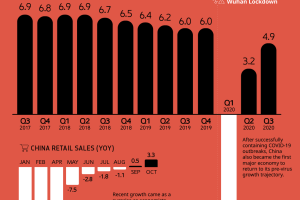The Briefing
- Political leanings aside, terrorism remains a top issue of concern for Americans
- Previous top issues, such as disinformation and U.S.–China relations, now rank lower
In the United States, there is a distinct difference on top foreign policy concerns between Democrats and Republicans.
This chart uses data from Morning Consult to assess the top policy concerns of Americans.
The Top Concerns
Overall, the average American is most concerned about terrorism, immigration, and drug trafficking. Interestingly, this list corresponds with the concerns of the average Republican, though falling in a different order.
Meanwhile, Democrats are chiefly worried about climate change, another global pandemic, and terrorism.
Here’s a breakdown of the policy concerns at large and across political parties.
| Overall Rank with Americans | Foreign Policy Concern | Share of Voters Listing it as a Top Concern | Share of Democrats Listing it as a Top Concern | Share of Republicans Listing it as a Top Concern |
|---|---|---|---|---|
| #1 | Terrorism | 49% | 38% | 62% |
| #2 | Immigration | 43% | 22% | 67% |
| #3 | Drug trafficking | 43% | 30% | 59% |
| #4 | Cyberattacks | 39% | 35% | 40% |
| #5 | Climate change | 38% | 54% | 17% |
| #6 | Preventing a global economic crisis | 32% | 33% | 31% |
| #7 | Securing critical supply chains | 30% | 27% | 34% |
| #8 | Preventing another global pandemic | 30% | 38% | 22% |
| #9 | Russia’s invasion of Ukraine | 27% | 33% | 21% |
| #10 | Protecting human rights globally | 25% | 31% | 18% |
| #11 | Preventing disinformation | 24% | 29% | 21% |
| #12 | U.S.-China relations | 24% | 19% | 31% |
| #13 | Iran nuclear deal | 21% | 19% | 24% |
| #14 | Upholding democracy globally | 15% | 22% | 8% |
Notably, the concern around U.S.-China relations ranks considerably low, as does preventing disinformation. Upholding democracy worldwide ranks extremely low with Republicans.
America’s Foreign Policy
Along party lines, the results are not surprising. Democrats skew towards multilateralism and want to engage with foreign bodies and other countries to tackle global issues. Republicans are generally more concerned with what’s happening at home.
Looking at the country as a whole and its relations with other nations, however, Americans lean more towards an America-first focus. According to Morning Consult, 39% of registered voters want to decrease U.S. involvement in other countries’ affairs, whereas 20% want to increase it; 30% want to keep the status quo.
Here’s a closer look at Americans’ desire to get involved in a variety of foreign policy initiatives:
| Issue | Increase Efforts | Decrease Efforts | Neither |
|---|---|---|---|
| Overseas Troop Deployment | 21% | 37% | 30% |
| Trade and Tariffs | 41% | 15% | 29% |
| Involvement with International Organizations | 35% | 21% | 32% |
| Resolution of Military Disputes | 38% | 16% | 33% |
| Resolution of Economic Disputes | 43% | 13% | 31% |
As of October 2022
The U.S. Midterm Elections
With midterm elections underway, America’s foreign policy may not be the most important factor for voters. Pew Research Center found that in these congressional elections, foreign policy only ranked 12th among other key issues considered “very important” by registered voters.
The top five concerns of voters in these midterms are:
- The economy
- The future of democracy within the U.S.
- Education
- Healthcare
- Energy policy
Regardless, the U.S. has a massive impact in foreign affairs and the results of the country’s midterm elections will likely cause a ripple effect globally. If Republicans win the House—which is looking extremely likely—and the Senate, President Biden’s foreign policy initiatives and priorities could be drastically restricted.
Where does this data come from?
Source: Morning Consult
Data notes: This ranking is made using the share of registered U.S. voters who identified the given issue as a top 5 concern for the country. For example, only 30% of registered voters said securing critical supply chains was a top 5 concern which is why it’s #7, whereas 43% said immigration was a top concern, ranking it at #2.





